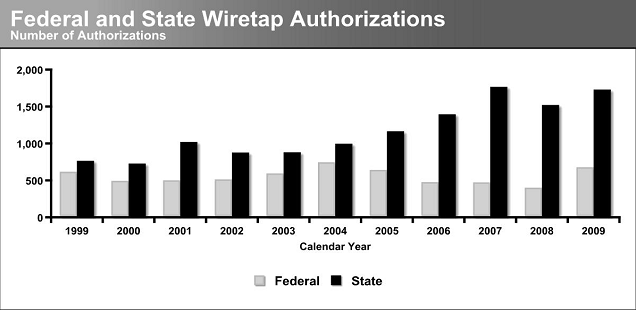Police Wiretapping Jumps 26 PercentBy Ryan SingelWired May. 04, 2010 |
Popular 
ADL Urged Congress to Pass FISA Law Spying on Americans to 'Protect Israel'

Rep. Thomas Massie Warns Congress is Trying to Pass Hate Speech Laws to Outlaw Criticism of Israel

'Sniper Seen on Roof Overlooking Pro-Palestine Protest' at Indiana University

Mike Johnson Pushes Debunked Lie That Israeli Babies Were 'Cooked in Ovens' On October 7

Claim Jewish Student Was 'Stabbed In The Eye' by Pro-Palestine Protester Draws Mockery After Video Released
  The number of wiretaps authorized by state and federal judges in criminal investigations jumped 26 percent from 2008 to 2009, according to a report released Friday by the Administrative Office of the U.S. Courts. The number of wiretaps authorized by state and federal judges in criminal investigations jumped 26 percent from 2008 to 2009, according to a report released Friday by the Administrative Office of the U.S. Courts.Courts authorized 2,376 criminal wiretap orders in 2009, with 96 percent targeting mobile phones in drug cases, according to the report. Federal officials requested 663 of the wiretaps, while 24 states accounted for 1,713 orders. Not one request for a wiretap was turned down. Each wiretap caught the communications of an average of 113 people, meaning that 268,488 people had text messages or phone calls monitored through the surveillance in 2009, a new record. Only 19 percent of the intercepted communications were incriminating, the same as in 2008. The report attributes some of the rise in the numbers to better reporting by the nation’s courts. The 2009 taps led to the arrests of 4,537 people and 678 convictions. A wiretap authorized in 2008 in a drug case in Arizona netted 169 arrests and 116 convictions, while a drug-case wiretap from 2007 in Southern California led to 170 arrests and 17 convictions, prosecutors told the court this year. Law enforcement officials have long warned that encryption technology allows criminals to hide their activities, but investigators encountered encrypted communications only one time during 2009’s wiretaps. The state investigators told the court that the encryption did not prevent them from getting the plain text of the messages. The numbers in the report do not include wiretap orders in terrorism investigations, which go through a secret court in Washington, D.C. They also don’t account for the number of Americans whose communications were caught by the National Security Agency’s warrantless wiretapping program, which Congress legalized in July 2008. Only four intercepts were reported as exclusively targeting “electronic” devices — including pagers, fax machines and computers – though 32 wiretap warrants were “combination” orders covering more than a single type of communication equipment. While federal law allows law enforcement officers to get broad orders for “roving” wiretaps when they believe a suspect is switching phones often, no such federal orders were approved in 2009. However, 16 roving warrants were approved by states. Wiretaps do not come cheaply, with each order costing on average $52,200. Taps lasted, on average, 42 days. The busiest federal wiretap came from an Arizona drug investigation where an order targeting mobile phones caught 31,062 messages over 71 days. The tally does not include subpoenas or warrants issued for e-mails or documents stored in the cloud using Gmail, Hotmail or ISP’s internet services, nor does it include search warrants issued to seize e-mails stored on a target’s home computer. |



